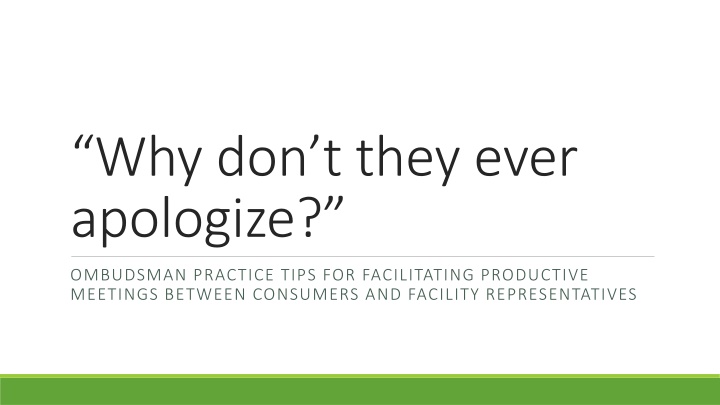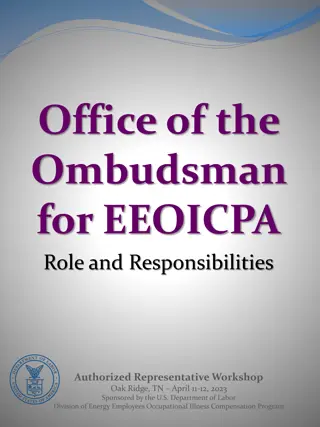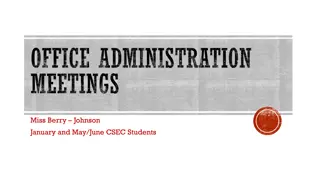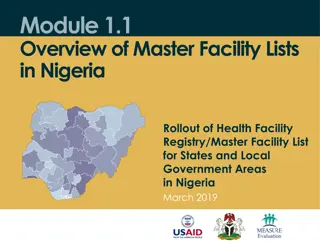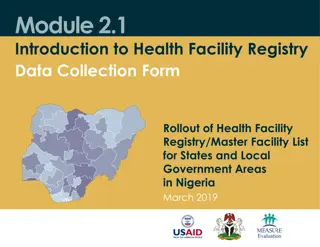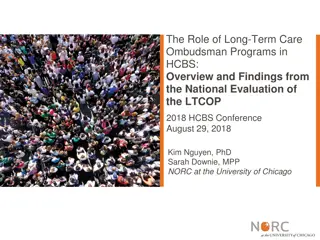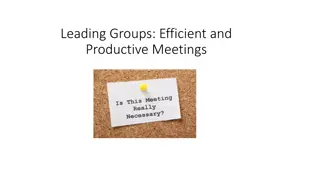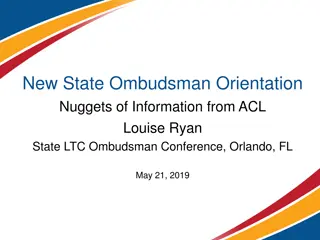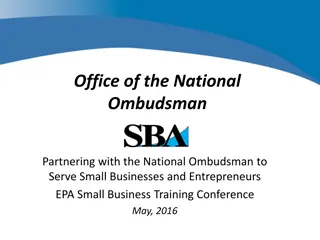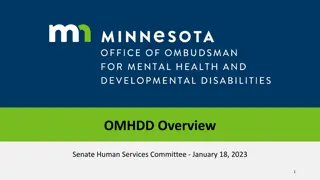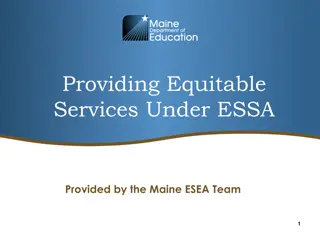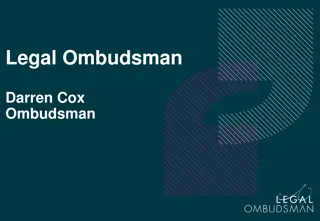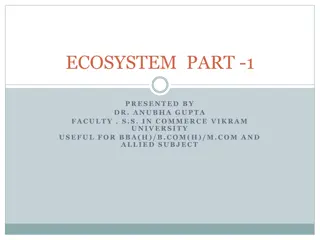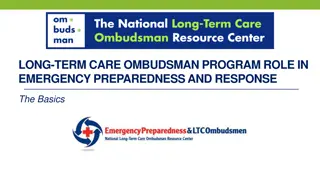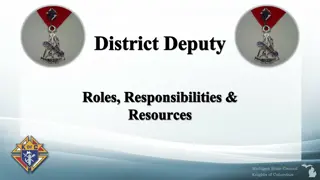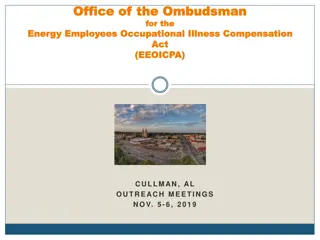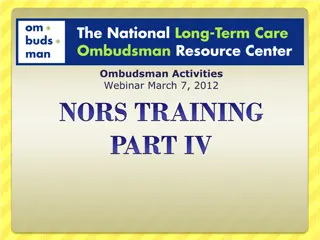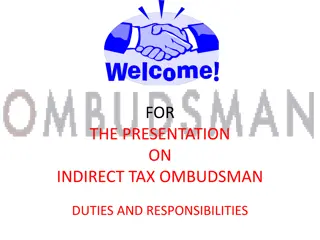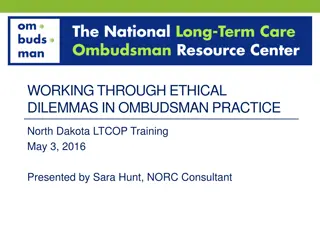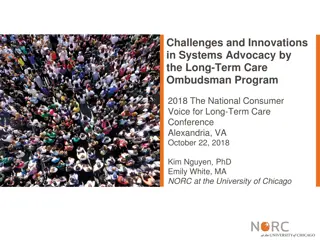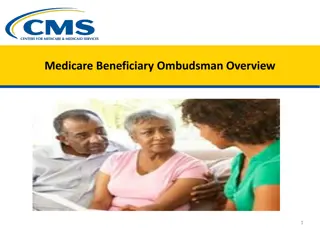Facilitating Productive Meetings: Tips from Ombudsman Practice for Consumers and Facility Representatives
Explore insightful tips from Ombudsman experts on navigating challenging situations between consumers and facility representatives, addressing common dynamics, advocating for rights, and the value of effective communication to foster trust and resolution.
Download Presentation

Please find below an Image/Link to download the presentation.
The content on the website is provided AS IS for your information and personal use only. It may not be sold, licensed, or shared on other websites without obtaining consent from the author.If you encounter any issues during the download, it is possible that the publisher has removed the file from their server.
You are allowed to download the files provided on this website for personal or commercial use, subject to the condition that they are used lawfully. All files are the property of their respective owners.
The content on the website is provided AS IS for your information and personal use only. It may not be sold, licensed, or shared on other websites without obtaining consent from the author.
E N D
Presentation Transcript
Why dont they ever apologize? OMBUDSMAN PRACTICE TIPS FOR FACILITATING PRODUCTIVE MEETINGS BETWEEN CONSUMERS AND FACILITY REPRESENTATIVES
Presenters Iris C. Freeman, MSW Board Member and Founding Chair, Minnesota Elder Justice Center Adjunct Professor in Elder Justice, Mitchell Hamline School of Law Cheryl Hennen, BA State Long-Term Care Ombudsman Office of Ombudsman for Long-Term Care Marit Peterson, JD Program Director, Minnesota Elder Justice Center Adjunct Professor in Philosophy, Augsburg College
Content for this session Oil and water common dynamics (Iris) Ombudsman as advocate and facilitator (Cheryl) The Right to be heard lessons from other victim services fields (Marit) Public policy fix or fault? (Panel)
Families under pressure Sadness and regret for the nursing home admission Criticism from siblings Perhaps unrealistic expectations of individual attention resident will receive Cost keeps going up and value seems to go down Tried talking to staff, despite turnover and language gaps Feel stonewalled by supervisory nurses and administration Twice wronged violation of trust or contract and no apology And then there s a breaking point
This Photo by Unknown Author is licensed under CC BY-NC-ND What are some other factors?
(Facility representatives) Why not apologize? Care here is consistently excellent. No apology is needed. Apologize once, and you ll never here the end of it. You ll be apologizing forever. We did what the resident wanted, not what the daughter is yelling about. I don t dare let down my guard and be emotional. Apology is an admission of guilt. I was trained by my supervisor never to apologize. It s a liability thing. If she s so angry, why doesn t she just take her mother someplace else.
Apologies, in general Really, not just an apology, an apology with agreed-upon changes in care Can be healing for both parties Can restore trust Are a sign of taking responsibility (leadership) Can ease the way for the victim/family to have empathy for the perpetrator Can reduce the likelihood that the conflict will escalate to litigation Can reduce the time it takes to make things right for the resident But an apology cannot undo the harm
Ombudsman as advocate and facilitator THE TEACHING MOMENTS
BY-SA NC-ND Those fireworks aren t the Fourth of July! Planning steps for approaching an already heated conflict
When trouble brews, you start planning Do you know who to go to? Does s/he have the authority to resolve the conflict? What is the specific problem? Whose problem is it? What has been tried to resolve the problem? How does the resident/complainant want to approach the problem? Do those wishes coincide? Is the resident in immediate danger?
Its about empowerment Definition: the process of becoming stronger and more confident, especially in controlling ones life and claiming ones rights. Resident empowerment is an important part of making residents feel like they truly at home they do have a voice in what they do. Ability/freedom to independently make decisions. Right to be fully informed Federal law states (nursing homes) the facility must listen to and act upon recommendations and grievances of residents and families concerning resident care and life in the facility.
Care conferences gone bad This Photo by Unknown Author is licensed under CC BY-SA This Photo by Unknown Author is licensed under CC BY-NC
Ombudsman as educator Teaching facility staff and administration to appreciate residents and families feelings Formal training, building relationships
Group exercise This Photo by Unknown Author is licensed under CC BY-ND
Participants Case Examples Bragging is acceptable in this setting.
Lessons from other victim services fields CREATING A CULTURE OF NONVIOLENCE AND RESPONSIVENESS
Creating culture When we re talking about creating a culture of nonviolence, the operative word is culture : The attitudes and behavior characteristics of a particular group The sum of attitudes, customs or beliefs that distinguishes one group from another
Creating culture Requires: Clarity (transparency) Consistency Communication (with collaborators) Curiosity Leadership by example
Happening in context Complex relationships Complex requirements Complex emotional needs Complex and diverse approaches to problem solving
Within families Long, complicated parent/child, sibling relationships Power and control battles, conflict Sibling rivalries and estrangements Histories of dependency, unaccountability, lack of responsibility, bullying, manipulation Privacy and secrecy
Externally Conflict between: Family and staff Staff and staff Staff and administration And others your experience demonstrates!
Shared destinations but different travel plans In the victim advocacy model: Seeking continuity and security when the victim (resident) is at the center of the dispute. Victim (resident) centered; trauma informed
Trauma informed victim services Key concepts: Safety Trustworthiness Choice Collaboration Empowerment
Trauma informed victim services Three elements to trauma-informed approaches in victim services: 1. Realizing the prevalence of trauma. 2. Recognizing how trauma affects all individuals involved with the program, organization, or system, including its own workforce. 3. Responding by putting this knowledge into practice.
Trauma informed victim services From the Office for Victims of Crime Training and Technical Assistance Center (OVC-TTAC): Trauma affects how victims see themselves ("I am helpless," "worthless"), their worldview (the world is dangerous, no one can protect me), and relationships ("I cannot trust anyone"). These beliefs affect how victims respond to services and the criminal justice system
Victim advocacy strategies Approaches that will be familiar to you! Listen with compassion and without judgment Believe her or him; usually the initial description is the tip of the iceberg Be available to hear the whole story, in the victim s own words. Give him or her time to think about what he or she wants to say next. You may be the first person he or she has confided in. Affirm her or his right to safety; and affirm that safety is your first concern. Reassure that abuse is not his or her fault.
Victim advocacy strategies system level Culture creation: Clear communication about expectations for all at the outset Consistency in responses to successes and failures Transparency in responses to successes and failures (to the extent appropriate) Offer ongoing educational opportunities Offer peer models and supports Offer trauma-informed advocacy services Engage victims/survivors (residents) in program planning, development of responses, curriculum development Identify collaborators and other resources make available to all!
Public Policy CAN PUBLIC POLICY INFLUENCE OUR CAPACITY TO FACILITATE RESPECTFUL MEETINGS AND CARE CONFERENCES?
Public policy considerations Consumer protections oRights to express grievances and receive a response oRights against retaliation for expressing a grievance oRights governing discharge and transfer Security cameras Mandatory arbitration clauses Negligence and liability laws Apology laws (disconnecting an apology from liability)
To conclude, you really can mix oil and water! Hint: Add Flour. You can even get cookies. But sometimes you just get slimy goop. This Photo by Unknown Author is licensed under CC BY
Thank you! Heres how to reach us. Iris C. Freeman iris.freeman@mitchellhamline.edu 612-834-4747 Cheryl Hennen cheryl.hennen@state.mn.us 651-431-2553 Marit Peterson marit.Peterson@elderjusticemn.org 651-440-9303
